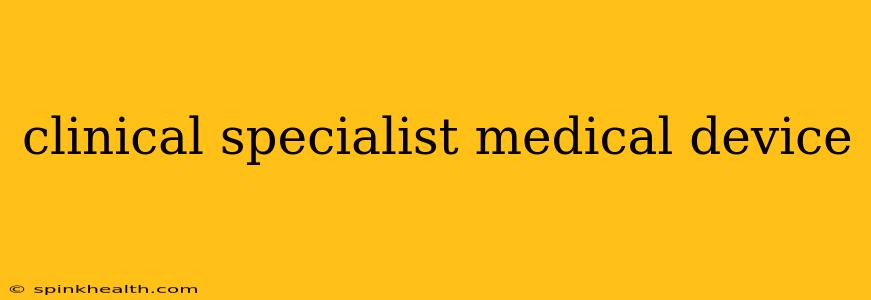The sterile scent of antiseptic, the rhythmic beeping of monitors, the hushed urgency of a hospital room – these are familiar sounds to a clinical specialist in medical devices. But what exactly is a clinical specialist in this field? It's more than just technical expertise; it's a blend of science, compassion, and unwavering dedication to improving patient care. This isn't just a job; it's a calling.
Let's journey into a typical day, exploring the diverse responsibilities and the crucial role these professionals play in the healthcare landscape.
What Does a Clinical Specialist in Medical Devices Do?
This multifaceted role often begins before the patient even sees the device. Imagine Sarah, a seasoned clinical specialist for a leading cardiac device manufacturer. Her day might start with reviewing the latest clinical trial data, ensuring the efficacy and safety of implantable cardioverter-defibrillators (ICDs). This requires a deep understanding of cardiology, physiology, and the intricacies of the device itself.
Then, it's off to the hospital. Sarah might be assisting a surgeon during an ICD implantation, offering technical expertise and ensuring the procedure runs smoothly. This isn't just about the device; it's about the patient's well-being, requiring meticulous attention to detail and a calm demeanor in a high-pressure environment.
After the procedure, Sarah's work continues. She'll provide training to hospital staff on the device's operation and maintenance, ensuring they're confident and competent in using this life-saving technology. This often involves troubleshooting technical issues, providing remote support, and answering queries from clinicians. It's a continuous cycle of education, support, and problem-solving.
What Education and Skills Are Needed to Become a Clinical Specialist in Medical Devices?
H2: What qualifications are necessary to become a clinical specialist in medical devices?
Becoming a clinical specialist requires a robust educational foundation. A bachelor's degree in a relevant field, such as biomedical engineering, nursing, or a related healthcare discipline, is typically the minimum requirement. Further specialization through master's degrees or certifications in medical device technology can significantly enhance career prospects. Crucially, many companies provide extensive in-house training programs to equip specialists with the knowledge needed to handle specific devices and procedures.
Beyond formal education, key skills include:
- Technical Proficiency: A deep understanding of medical devices, their functionality, and their applications.
- Clinical Acumen: A strong grasp of relevant medical concepts and procedures.
- Problem-Solving Abilities: The ability to diagnose and resolve technical issues efficiently and effectively.
- Communication Skills: Excellent communication and interpersonal skills are vital for interacting with surgeons, nurses, and patients.
- Collaboration: Working effectively within multidisciplinary healthcare teams.
What is the career path for a clinical specialist in medical devices?
H2: What are the career progression opportunities for clinical specialists in medical devices?
The career trajectory for a clinical specialist can be quite dynamic. With experience, individuals can progress to senior clinical specialist roles, leading teams and taking on greater responsibility. Some might move into management positions, overseeing clinical operations or training programs. Others may pursue specialized certifications or advanced degrees to further their expertise in particular areas, like electrophysiology or neurology. The options are varied and depend on individual aspirations and professional development.
How much does a clinical specialist in medical devices earn?
H2: What is the salary range for a clinical specialist in medical devices?
Salary expectations depend greatly on factors like experience, location, company, and specialization. However, clinical specialists in medical devices generally command competitive salaries, reflecting the high level of skill and responsibility involved. Researching salary data within specific geographical locations and for particular device types provides a clearer picture of typical compensation.
What are the challenges faced by clinical specialists in medical devices?
H3: What are the day-to-day challenges faced by clinical specialists in medical devices?
While rewarding, this profession isn't without its challenges. The fast-paced nature of hospital environments, the pressure of working with life-saving technologies, and the constant need for upskilling to stay abreast of technological advancements can be demanding. Effective time management, adaptability, and strong problem-solving skills are crucial for success in this dynamic field.
The Future of Clinical Specialists in Medical Devices
The healthcare landscape is constantly evolving, driven by technological advancements and a growing demand for advanced medical solutions. This means that the role of the clinical specialist in medical devices will only become more critical. As new technologies emerge, the need for skilled professionals who can bridge the gap between innovation and patient care will continue to rise, ensuring a bright and impactful future for this vital profession. The dedication and expertise of these individuals are not merely supporting technology; they are shaping the future of healthcare itself.

